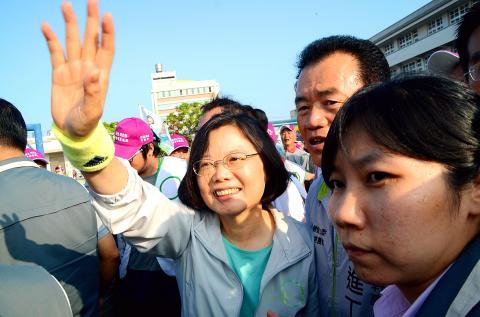Democratic Progressive Party (DPP) presidential candidate Tsai Ing-wen (蔡英文) yesterday said that she was disappointed with the outcome of a meeting between President Ma Ying-jeou (馬英九) and Chinese President Xi Jinping (習近平).
“We regret that the only result of the Ma-Xi meeting is the use of politics to limit the choices of the Taiwanese public regarding cross-strait relations on an international stage,” Tsai told a news conference in Yunlin County’s Douliu City (斗六) during a stop in her central Taiwan campaign trip.
“This morning, we expected him to do three things for the people of Taiwan: confirming the ability for the 23 million people of Taiwan to make their own choices; establishing that there would be no political preconditions in the development of cross-strait relations; and ensuring equal footing and dignity in cross-strait relations. However, he did not accomplish any one of those three objectives,” she added.

Photo: Yen Hung-chun, Taipei Times
Tsai said that she was very disappointed after watching the live TV coverage of the Ma-Xi meeting in Singapore, adding that Ma departed yesterday morning as the public questioned his decisionmaking and returned with only more controversy.
“The Taiwanese public will not accept a political framework that lacks democratic procedures and the support of public opinion,” Tsai said.
“I am confident about Taiwan’s democracy and people, and I will work with the people of Taiwan in a more democratic way to make up for the damage caused by the Ma-Xi meeting,” she added.
Prior to the event, Tsai said that the Ma-Xi meeting was not a “historical meeting” as Ma had claimed, but rather only a “newsworthy meeting.”
Meanwhile, DPP caucus whip Ker Chien-ming (柯建銘) was harsher in his criticism of the meeting, accusing Ma of “kowtowing and surrendering” to Xi during the event.
“Ma said in front of Xi that the ‘1992 consensus’ is an agreement on ‘one China’ reached in November 1992, meaning that he has abandoned his long-claimed stance of the ‘1992 consensus’ is ‘one China, different interpretations,’” Ker said. “That was the president of the Republic of China [ROC] openly denouncing the ROC at an international event; a serious setback for Taiwan’s sovereignty.”
Ma’s actions are the equivalent of “kowtowing and surrendering. We cannot accept such remarks, and express our strong protest against them,” Ker added.
Meanwhile, Taiwan Solidarity Union Chairman Huang Kun-huei (黃昆輝) was also critical of Ma’s remarks on the “1992 consensus” made during the meeting, saying that Ma only proved that his previous definition of the “1992 consensus” was a lie.
Ma echoing Beijing’s call for “one China” and agreeing with Xi’s opposition to Taiwanese independence are unforgivable, Huang added.
“Ma has further limited the next generation’s choices regarding Taiwan’s future,” Huang said. “That is an unforgivable crime.”

The US government has signed defense cooperation agreements with Japan and the Philippines to boost the deterrence capabilities of countries in the first island chain, a report by the National Security Bureau (NSB) showed. The main countries on the first island chain include the two nations and Taiwan. The bureau is to present the report at a meeting of the legislature’s Foreign Affairs and National Defense Committee tomorrow. The US military has deployed Typhon missile systems to Japan’s Yamaguchi Prefecture and Zambales province in the Philippines during their joint military exercises. It has also installed NMESIS anti-ship systems in Japan’s Okinawa

‘WIN-WIN’: The Philippines, and central and eastern European countries are important potential drone cooperation partners, Minister of Foreign Affairs Lin Chia-lung said Minister of Foreign Affairs Lin Chia-lung (林佳龍) in an interview published yesterday confirmed that there are joint ventures between Taiwan and Poland in the drone industry. Lin made the remark in an exclusive interview with the Chinese-language Liberty Times (the Taipei Times’ sister paper). The government-backed Taiwan Excellence Drone International Business Opportunities Alliance and the Polish Chamber of Unmanned Systems on Wednesday last week signed a memorandum of understanding in Poland to develop a “non-China” supply chain for drones and work together on key technologies. Asked if Taiwan prioritized Poland among central and eastern European countries in drone collaboration, Lin

TRAGEDY STRIKES TAIPEI: The suspect died after falling off a building after he threw smoke grenades into Taipei Main Station and went on a killing spree in Zhongshan A 27-year-old suspect allegedly threw smoke grenades in Taipei Main Station and then proceeded to Zhongshan MRT Station in a random killing spree that resulted in the death of the suspect and two other civilians, and seven injured, including one in critical condition, as of press time last night. The suspect, identified as a man surnamed Chang Wen (張文), allegedly began the attack at Taipei Main Station, the Taipei Fire Department said, adding that it received a report at 5:24pm that smoke grenades had been thrown in the station. One man in his 50s was rushed to hospital after a cardiac arrest

ON ALERT: Taiwan’s partners would issue warnings if China attempted to use Interpol to target Taiwanese, and the global body has mechanisms to prevent it, an official said China has stationed two to four people specializing in Taiwan affairs at its embassies in several democratic countries to monitor and harass Taiwanese, actions that the host nations would not tolerate, National Security Bureau (NSB) Director-General Tsai Ming-yen (蔡明彥) said yesterday. Tsai made the comments at a meeting of the legislature’s Foreign Affairs and National Defense Committee, which asked him and Minister of National Defense Wellington Koo (顧立雄) to report on potential conflicts in the Taiwan Strait and military preparedness. Democratic Progressive Party (DPP) Legislator Michelle Lin (林楚茵) expressed concern that Beijing has posted personnel from China’s Taiwan Affairs Office to its